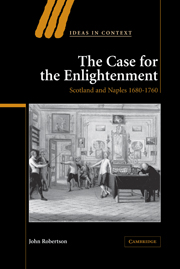Book contents
- Frontmatter
- Contents
- Preface
- 1 The case for the Enlightenment
- 2 Scotland and Naples in 1700
- 3 The intellectual worlds of Naples and Scotland 1680–c.1725
- 4 The predicament of ‘kingdoms governed as provinces’
- 5 Vico, after Bayle
- 6 Hume, after Bayle and Mandeville
- 7 The advent of Enlightenment: political economy in Naples and Scotland 1730–1760
- Conclusion: the Enlightenment vindicated?
- Bibliography
- Index
- IDEAS IN CONTEXT
7 - The advent of Enlightenment: political economy in Naples and Scotland 1730–1760
Published online by Cambridge University Press: 15 October 2009
- Frontmatter
- Contents
- Preface
- 1 The case for the Enlightenment
- 2 Scotland and Naples in 1700
- 3 The intellectual worlds of Naples and Scotland 1680–c.1725
- 4 The predicament of ‘kingdoms governed as provinces’
- 5 Vico, after Bayle
- 6 Hume, after Bayle and Mandeville
- 7 The advent of Enlightenment: political economy in Naples and Scotland 1730–1760
- Conclusion: the Enlightenment vindicated?
- Bibliography
- Index
- IDEAS IN CONTEXT
Summary
CONTEXTS AND EXPECTATIONS
The preceding, extended comparison of the philosophies of Vico and Hume ended by emphasising difference. Vico had developed in successive versions of his New Science an account of human sociability in which men's actions manifested the guiding hand of divine providence, and from which it was impossible to infer a principle of progress. What Hume elaborated in the Treatise of Human Nature, by contrast, was an account of morality and society as purely human creations, the outcome of a remarkable combination of human nature and artifice. But no less important to the comparison was the identification of common ground between the two philosophers; without this, indeed, the comparison would have had little historical point. Vico and Hume, it was argued, shared a common preoccupation with the Augustinian-Epicurean account of the human condition, according to which men were weak and driven by their passions, to the extent that their pursuit of their own utility was barely compatible with the maintenance of society. Likewise common to Vico and to Hume was the conviction that the problem of unsociability could only be resolved in the course of history, in a process of socialisation. It was on these common foundations – in an important sense Epicurean foundations – that Vico and Hume built their different philosophies; and the same foundations, I now want to argue, provided the platform from which the Enlightenment was brought to Naples and Scotland in the middle of the eighteenth century.
- Type
- Chapter
- Information
- The Case for The EnlightenmentScotland and Naples 1680–1760, pp. 325 - 376Publisher: Cambridge University PressPrint publication year: 2005
- 1
- Cited by



